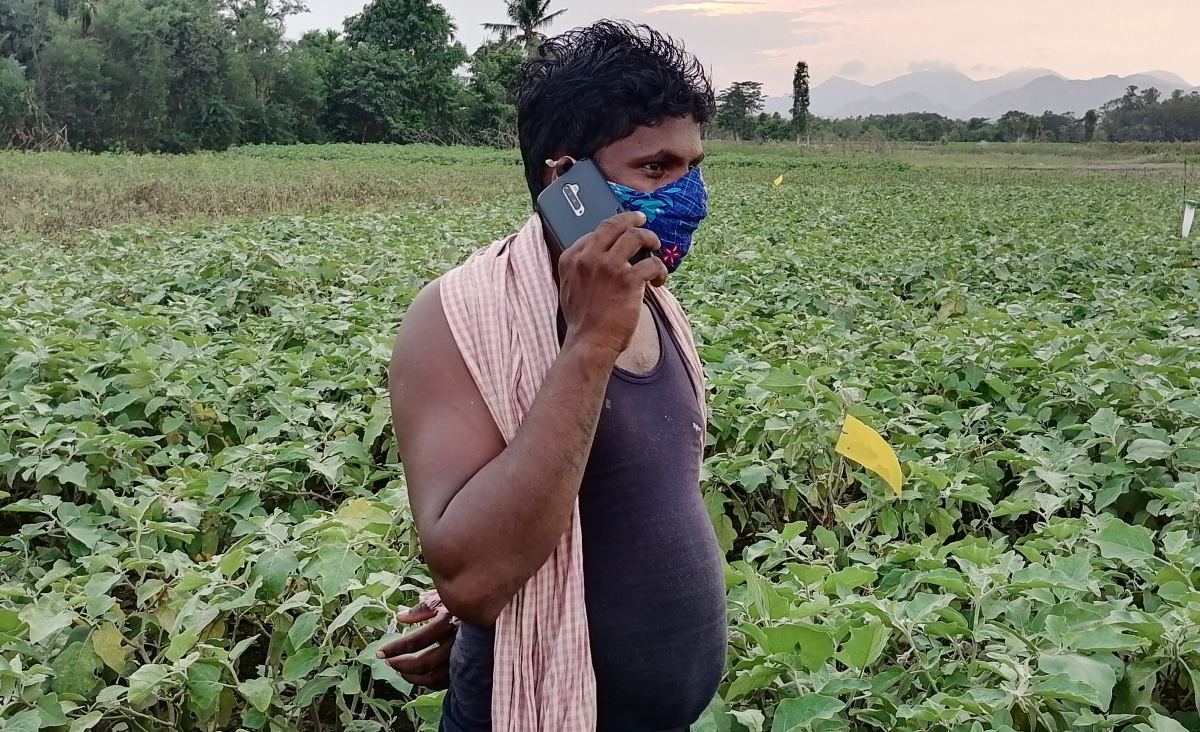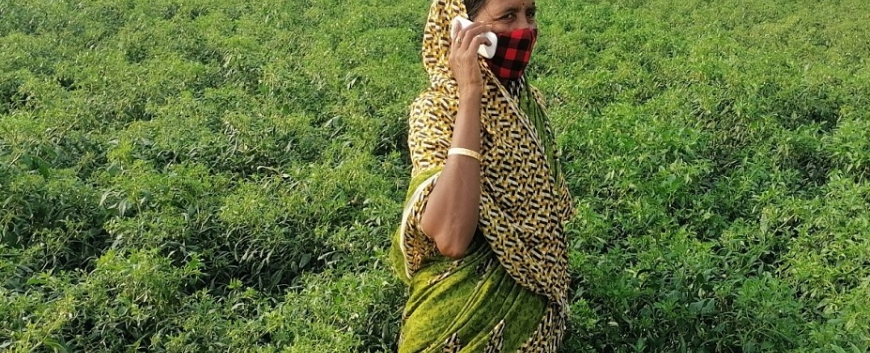Mobile Based Helpline services in Enhancing the Uptake of Climate Smart Agriculture Technologies
It is clearly evident that climate change is seriously affecting the farming community and agriculture production in India. Small holders are the most vulnerable to changing climate and variability and facing both abiotic and biotic risks in production. The Indian Economic survey 2017-18 estimated that “Farmer income losses from climate change could be between 15% and 18% on average, rising to anywhere between 20% and 25% in unirrigated areas”.The "RESILIENCE" project has been developed and ongoing in the selected climate hotspots of Assam and Odisha. A main focus of the project is to build the adaptive capacity of the men and women farmers to climate change, especially floods in Assam and droughts in Odisha.
variability and facing both abiotic and biotic risks in production. The Indian Economic survey 2017-18 estimated that “Farmer income losses from climate change could be between 15% and 18% on average, rising to anywhere between 20% and 25% in unirrigated areas”.The "RESILIENCE" project has been developed and ongoing in the selected climate hotspots of Assam and Odisha. A main focus of the project is to build the adaptive capacity of the men and women farmers to climate change, especially floods in Assam and droughts in Odisha.
Studies have demonstrated that demand based agricultural extension services support farmers in adoption of technology and diffusion through social networks. Deployment of digital tools by harnessing the advancement in the Information and Communication Technologies (ICTs) provides a platform to offer demand based, timely, locale specific and dynamic information services for the farmers to build their resilience capacity to combat climate risks. The "Helpline" service is one of the key digital tools to address the individual farmer’s queries on agriculture information, advisories and other services in time through mobile phone. By this way such simple tools support farmers and women in particular to practice climate smart technologies.
Operational framework of Helpline
The helpline numbers are popularised among the farmers and an expert panel have been constituted comprising a panel of agriculture experts from agriculture universities, KVK and agriculture department to address the queries. Farmers can call to the helpline number round the clock to clarify anything related to agriculture such as availability of seeds, pest, and diseases and nutrient management, Govt. Schemes, marketing information and post-harvest technologies. The farmers are connected with experts through conference call and get the answer for their queries.
Evidences from the field
The helpline services in the RESILIENCE project study sites received 3,386 queries from 3,372 farmers including 951 women farmers from April 2020 to April 2021 About 68 percent of the farmers have approached the helpline services for pest and disease management and agronomic management issues and means to access entitlement schemes. The Frequently Answer Questions showed the details of their information needs such as: Integrated nutrient management measures for agricultural and horticultural crops, selection of suitable variety in tomato, chillies and bittergourd, necessary soil and water management measures, seed treatment methods, information on Pradhan Mantri Kisan Samman Nidhi Yojana, a centrally sponsored scheme provides income support to small farmers.
Farmers feedback about Helpline services
 Mr Rabindra Mahanda, a small farmer from Badakrusunpur village in Ganjam district in Odisha state happily shared that the helpline provides the needy advisories at the farm gate and the farmers need not travel to farm extension centres. This is a great opportunity for all the farmers to access dynamic need-based information services.
Mr Rabindra Mahanda, a small farmer from Badakrusunpur village in Ganjam district in Odisha state happily shared that the helpline provides the needy advisories at the farm gate and the farmers need not travel to farm extension centres. This is a great opportunity for all the farmers to access dynamic need-based information services.
Another farmer, Mr. Pintu Prasad Swain, Sorisibili village in Ganjam district in Odisha state, thanked the Resilience project helpline services for solving the thrips menace and fruit borer incidences in his hybrid bittergourd crop. The timely agro-advisories on pest management helped him to take informed decisions and reduce crop losses. He happily said that he got the advisories from Dr Prasanta Kumar Panda, KVK scientist through helpline services. He advised to spray thiomethaxom 50 gm + emamectin benzoate 100 per acre for controlling both thrips and fruit borer. The advisories were so effective, and the farmer could save the crop in time.
Ms Juntidoss, a woman farmer from Merapani village, Golaghat district of Assam state recalled how the helpline helped her papaya crop grown in an acre recovered from papaya ring mosaic virus. On seeing the green concentric rings on the leaves and small papaya fruits, she called the helpline and got the timely advisories. The expert suggested to spray Pseudomonas 1 kg + Fermented curd 2.5 lit per acre twice in 10 days interval. He also advised to install yellow sticky trap @ 10 per acre to attract and kill the vector. These measures helped swiftly to recover the crop from the virus diseases and the papaya farmers saved the crop.
Like the above farmers, many other farmers have shared their benefits of helpline services in accessing agriculture extension services. The evidences from the field clearly demonstrates that Helpline services is one of the simple ICT tools helps to access the demand driven and farmer centric agriculture extension services.
The team has received feedback from farmers and based on that midcourse corrections are being planned to further strengthen this effort and enable more farmers, particularly women farmers to utilize these services. Besides, efforts are being taken to institutionalize and expand such timely and farmer-centric online services through district KVKs and the Department of Agriculture, which are currently relying mostly on in person visits as well as generic advisories for the region.


